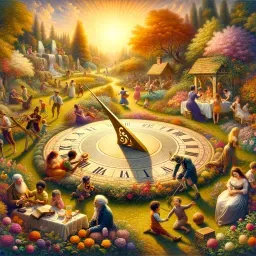With mirth and laughter let old wrinkles come

0
0
0
0
- Meaning
- This line captures a philosophy that encourages people to embrace aging with joy and laughter. Rather than viewing wrinkles and old age as negative or something to be feared, the phrase suggests that these are natural parts of life and should be welcomed if they come as the result of a life filled with happiness and mirth.
- Allegory
- The elderly person's kind eyes and deep wrinkles symbolize the marks of wisdom and countless moments of joy. The vibrant scenes of children playing and friends laughing represent the joyous memories and experiences accumulated over a lifetime. Flowers blooming under the sun illustrate the beauty and growth of a life well-lived. Clear skies and warm light rays enhance the atmosphere of contentment and warmth, showing the positive and serene acceptance of aging. The transition from youthful moments to the tranquility of old age reflects the seamless journey of life, merging the vibrancy of youth with the wisdom and peace of age, underscoring the harmony between living joyfully and embracing the aging process.
- Applicability
- In personal life, this teaching can be applied by focusing on finding joy and mirth in everyday experiences, cherishing moments of laughter, and not focusing excessively on the physical signs of aging. It offers a positive perspective that promotes living in the moment and finding contentment in the aging process by associating it with a lifetime of happiness.
- Impact
- Shakespeare's works, including this phrase, have had a profound impact on literature, language, and culture. The phrase reminds readers of the value of joy and laughter and has resonated through centuries, finding its way into discussions about the human condition and the philosophy of aging gracefully.
- Historical Context
- "The Merchant of Venice" was written around 1596-1598 during the Elizabethan era, a period characterized by flourishing English literature and drama, with Shakespeare being a prominent figure. This was a time when themes of human nature, joy, sorrow, and the passage of time were commonly explored in literature.
- Criticisms
- There have been no major controversies specifically surrounding this phrase. However, some might argue against the ease with which joy can be found in old age, pointing out the challenges and health issues that come with aging. Hence, the criticism could stem from a realistic standpoint that acknowledges the difficulties of growing older.
- Variations
- While the essence of welcoming aging with joy is relatively universal, different cultures interpret aging differently. In some Eastern cultures, for example, aging is revered and associated with wisdom and respect. Hence, variations to this concept may involve more focus on the reverence and respect for elders rather than simply the joy aspect.
-

It is better to be alone than in bad company.
-

Pleasure and action make the hours seem short.
-

Happiness is not something ready-made. It comes from your own actions.
-

As merry as the day is long.
-

What a piece of work is a man! How noble in reason, how infinite in faculty!
-

Reputation is an idle and most false imposition; oft got without merit, and lost without deserving.
-

As You Like It.
-

Love all, trust a few, do wrong to none.
-

Nothing will come of nothing.
-

False face must hide what the false heart doth know.
-

I am constant as the northern star.
No Comments